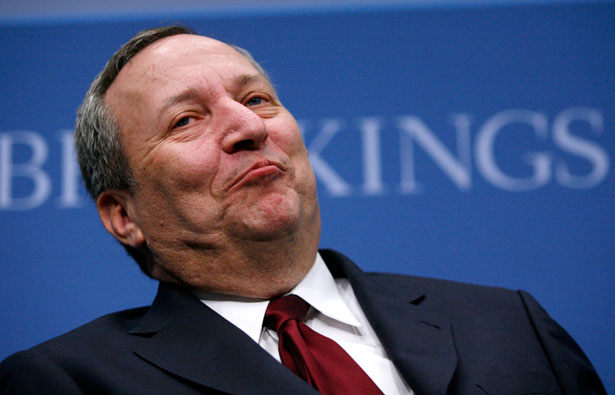
Lawrence Summers. (Reuters/Molly Riley)
This story originally appeared at Truthdig. Robert Scheer is the author of The Great American Stickup: How Reagan Republicans and Clinton Democrats Enriched Wall Street While Mugging Main Street (Nation Books).
Poor Lawrence Summers, he doesn’t get to be chairman of the Federal Reserve, aka the czar of the world’s economic order. It would have been the penultimate reward for a career advanced by a string of stunning failures, but this time around some key senators needed to confirm the president’s likely choice had the gumption to say they would not be fooled again.
Summers, who led the wrecking crew destroying the sensible regulation of the banking industry when he served as President Clinton’s Treasury secretary, was inexplicably picked by President Obama as his top adviser on salvaging an economy that Summers had done so much to destroy. First off, Summers undermined the ever prescient Brooksley Born, head of the Commodity Futures Trading Commission, who had warned in a “concept release” that the trading in unregulated derivatives during the first five years of the Clinton administration was spiraling dangerously out of control. Not so, Summers said in Senate testimony on July 30,1998, attacking Born:
In our view, the Release has cast the shadow of regulatory uncertainty over an otherwise thriving market—raising risks for the stability and competitiveness of American derivative trading. We believe that it is quite important that the doubts be eliminated.
Eliminated they were, when Summers engineered Congress’ passage of the Commodity Futures Modernization Act that Clinton signed into law, banning any and all government regulation of the over the counter derivatives market including the credit default swaps and collateralized debt obligations trading in housing mortgages that caused the greatest economic crisis since the Great Depression.
Summers’ defense of banning regulation by any government agency and through the application of any existing law was: “First, the parties to these kind of contracts are largely sophisticated financial institutions that would appear to be eminently capable of protecting themselves from fraud and counterparty insolvencies and most of which are already subject to basic safety and soundness regulation under existing banking and securities laws. … Second, given the nature of the underlying assets involved—namely supplies of financial exchange and other financial interests—there would seem to be little scope for market manipulation. …”
Consider the astounding stupidity, or is it mendacity, of that statement and ponder why candidate and then President Obama picked Summers as his key economic adviser. The answer is that Summers had the confidence of Wall Street, where he was “earning” $8 million from consulting and speaking fees when he was recruited into the Obama campaign. It helped in making Obama the preferred choice of Wall Street contributors in the 2008 election campaign.
Popular
"swipe left below to view more authors"Swipe →
Despite his occasionally populist rhetoric, Obama proved highly solicitous of Wall Street interests at the expense of Main Street, and under the guidance of Summers, the Bush strategy of bailing out Wall Street continued under Obama. The result of that betrayal of the public interest was marked last week in the release of two landmark reports on the true consequences of that bailout strategy.
In a key study of income inequality, economists at Berkeley and Oxford concluded that by 2012, when Obama was being re-elected, the richest 1 percent had skimmed off an astounding 95 percent of the gains in income since the official end of the recession in 2009. Thanks to the government program that bailed out the richest while sacrificing the rest, the top 1 percent acquired the biggest share of income since 1928, the previous high point of American income inequality.
In short, the government bailout program begun by Bush and continued by Obama under Summers’ guidance made the financial industry culprits whole, while abandoning the rest of America. Yet the “Costs and Consequences of the 2007-09 Financial Crisis,” according to a report last week from the Dallas Federal Reserve, is upward of $14 trillion, or the equivalent of $120,000 for every U.S. household. Between the third quarter of 2007 and the first quarter of 2009, thanks to the collapse of the derivatives market that Summers had assured the Senate was immune to “fraud and counterparty insolvencies,” U.S. household worth, according to the Dallas Fed, “plunged $16 trillion or 24 percent. …”
When all factors are considered, the Dallas Fed concluded that the “total cost of the crisis easily exceeds the value of the nation’s output for an entire year.” The Dallas Fed warns that the economy may never return to its previously robust growth curve.
The taxpayer funding for the banksters was not repaid, as their propaganda suggests, but instead was stolen from programs needed to improve the well-being of the citizenry. “Government funds allocated to fighting the effects of the crisis,” the Dallas Fed report argued, “couldn’t be spent on other items such as infrastructure and education that enhances the nation’s capital stock—its productive capacity.”
As for Summers’ future, not to worry; after he left the Clinton administration and before signing up with the Obama White House, he admits to having added upward of $31 million to his wealth. Last week, with his Fed nomination still open, he had to pull back from one of his lucrative Citigroup speaking gigs, but now he is back in play. For Lawrence Summers, it should be remembered, “No Shame, No Gain.”
William Greider explains why the defeat of Summers is about more than the Fed.


